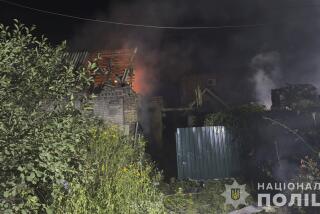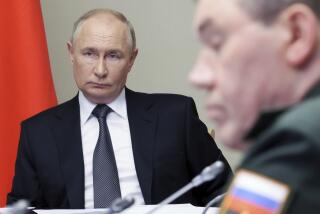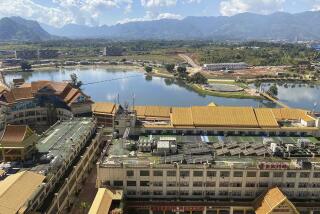Iraq Shows Off Recaptured Kirkuk : Rebellion: The city, which had been claimed by Kurdish rebels, appears deserted. Fighting continues to the north.
NICOSIA, Cyprus — Iraq showed the world on Sunday that President Saddam Hussein’s army is back in control in the northern oil city of Kirkuk, the biggest prize seized by Kurdish rebels in their post-Gulf War revolt.
Pressing a four-day-old counterattack in the north, Iraqi forces also reported the capture of Irbil, 50 miles north of Kirkuk, and its surrounding province.
A spokesman in Damascus, Syria, for the Kurdish Democratic Party said only that Irbil and Dahuk, northwest of Irbil, were under attack by Iraqi planes, helicopter gunships and artillery.
Western correspondents, taken to Kirkuk by Iraqi officials, found the city damaged and largely deserted.
Television pictures showed several bodies in a road, a supermarket stripped and burned, a wrecked museum of antiquities, burned-out cars and buses and a truckload of cheerful Iraqi government soldiers.
Edward Stourton of Britain’s Independent Television News, reporting from Kirkuk, said, “We toured enough of the town today to be able to say with some confidence that the government’s forces now control it again.”
He said journalists neither heard nor saw anything to indicate that resistance by the rebels was continuing. The journalists’ reports were reviewed by Iraqi censors.
President Saddam Hussein’s army regrouped after its Gulf War defeat and largely suppressed revolt in the Shiite Muslim heartland of southern Iraq.
It wheeled north last week to launch its counteroffensive against rebel Kurds--a non-Arab minority.
Baghdad announced Thursday that it had retaken Kirkuk, north of Baghdad.
Kurdish spokesmen abroad said Friday and Saturday that the rebels had struck back and, as late as Sunday, were fighting a see-saw battle inside the city.
Kurdish leaders reported heavy civilian casualties in the region and accused the government of genocide. They appealed for aid from the United Nations and from U.S.-led forces, which occupy a large slice of southern Iraq and command the air over the whole country but have refused to intervene.
Provincial Governor Hashim Hassan Majid told reporters in Kirkuk on Sunday that up to 25 people died in the fighting for Kirkuk. There were few casualties in the battle because the rebels were defeated within two hours, he said.
“After a short time they ran away, fleeing outside the city like rats,” Majid said through an interpreter.
Stourton of Independent Television News said that bodies filmed on a road were so badly burned that it was difficult to say whether they were rebels or loyalists, soldiers or civilians.
Baghdad Radio meanwhile reported that Izzat Ibrahim, vice chairman of Iraq’s ruling Revolutionary Command Council, sent Hussein a cable announcing “the glad tidings that the dear province of Irbil has been purged of traitors, renegades and agents of Zionism.”
Irbil, with 110,000 people, and Sulaymaniyah, near the Iranian border with 100,000 people, were the biggest towns in rebel hands after the loss of Kirkuk.
Iraqi refugees, meanwhile, were reported fleeing to Turkey.
Turkish border officials said that about 2,000 arrived Sunday, bringing a three-day total to 3,000. About 5,000 refugees had already arrived since the Gulf crisis started in August.
“Thousands have gone past and more and more are coming,” said a shopkeeper reached by telephone in Semdinli, the southeasternmost town in Turkey near the Iraqi and Iranian borders. “They need food, so we’re baking them extra bread and giving them honey.”
The influx is raising fears in Ankara of a repeat of August-September 1988, when from 60,000 to 100,000 Iraqi Kurds fled into Turkey after the end of the Iran-Iraq War.
More than 20,000 refugees from that time remain in three Turkish refugee settlements.
It is not clear if Kurdish refugees are now being accepted by the Turkish authorities, but they may be housed in a camp that officials say has now been set up on the border.
Free-lance writer Hugh Pope in Istanbul, Turkey, contributed to this report.
More to Read
Sign up for Essential California
The most important California stories and recommendations in your inbox every morning.
You may occasionally receive promotional content from the Los Angeles Times.










